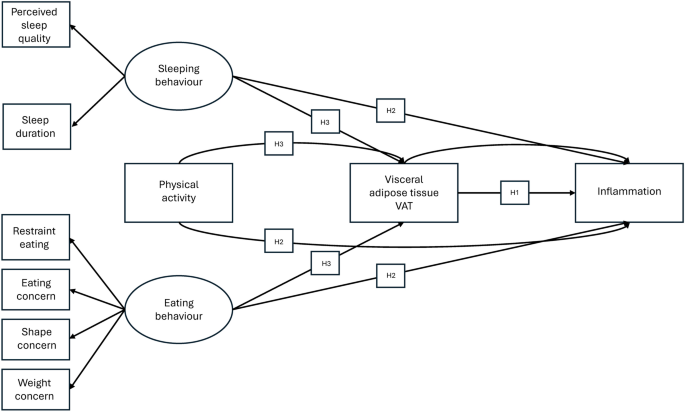This study examined the relationship between physical activity, eating behavior, sleep quality, and visceral adiposity (VAT) accumulation in menopausal women. The key findings are:

- Visceral adiposity is strongly associated with inflammation: VAT was found to be a strong predictor of metabolic inflammation.
- Physical activity reduces VAT and inflammation: Women who were more active had lower levels of VAT and inflammatory markers, such as glycated albumin (GlycaA).
- Eating behavior plays a role in reducing inflammation: Healthy eating habits, such as a balanced diet and regular food intake, were associated with reduced levels of VAT and inflammation.
- Poor sleep quality is linked to poorer health outcomes: Women who had poor sleep quality had higher levels of VAT and inflammatory markers.
- Comprehensive approach to health behaviors is necessary: Combining physical activity, healthy eating behavior, and sufficient sleep can have a significant impact on reducing VAT and inflammation.
The study's findings suggest that:
- Menopausal women with sedentary lifestyles are at increased risk of metabolic inflammation and cardiometabolic diseases.
- Encouraging physical activity, especially in those who are sedentary, may help reduce VAT and inflammatory markers.
- Healthy eating habits and sufficient sleep quality are also essential components of a healthy lifestyle.
- A comprehensive approach to health behaviors is necessary to mitigate the risks associated with VAT accumulation.
The limitations of the study include:
- Small sample size: The study had a relatively small number of participants, which may have increased the risk of Type II error.
- Cross-sectional design: The study was observational and did not follow participants over time, making it difficult to establish causality between the variables examined.
Future studies could benefit from:
- Larger, longitudinal designs to explore the temporal relationships between health behaviors and outcomes.
- Increased use of validated measures to assess physical activity, eating behavior, sleep quality, and VAT accumulation.
- Additional exploration of social factors, such as socioeconomic position, that may influence health behaviors and outcomes in menopausal women.
